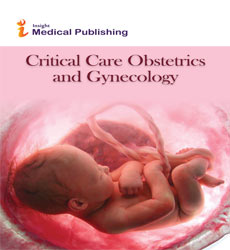Emergent Insights in Maternal-Fatal Critical Care
Paul Wendel
Department of Stroke, University of Health, Institutes of Neurological Disorder and Stroke, USA
Published Date: 2023-08-21DOI10.36648/2471-9803.9.3.123
Paul Wendel*
Department of Stroke, University of Health, California, USA
- *Corresponding Author:
- Paul Wendel
Department of Stroke,
University of Health, California,
USA,
E-mail: wendel@gmail.com
Received date: July 21, 2023, Manuscript No. IPCCO-23-17804; Editor assigned date: July 24, 2023, PreQC No. IPCCO-23-17804(PQ ); Reviewed date: August 07, 2023, QC No. IPCCO-23-17804; Revised date: August 14, 2023, Manuscript No. IPCCO-23-17804( R); Published date: August 21, 2023, DOI: 10.36648/2471-9803.9.4.123
Citation: Wendel P (2023) Emergent Insights in Maternal-Fatal Critical Care. Crit Care Obst Gyne Vol.9.No.4:123.
Description
Maternal-fetal critical care stands at the crossroads of obstetrics, neonatology, and critical care medicine, addressing complex medical conditions and obstetric complications that threaten the well-being of both the pregnant woman and her unborn child. As medical science continues to evolve, so too do the insights into managing critical cases in maternal-fetal medicine. This article delves into the emergent insights in maternal-fetal critical care and underscores the indispensable role of a multidisciplinary approach in improving outcomes for both mother and baby. Maternal-fetal critical care involves the management of pregnant women who require intensive medical intervention due to medical conditions, obstetric complications, or a combination of both. Conditions such as severe preeclampsia, placental abruption, HELLP syndrome, and maternal cardiac disorders can significantly impact both maternal health and fetal development. The intricate intertwining of the mother's health with that of her fetus necessitates a nuanced and collaborative approach. A hallmark of effective maternalfetal critical care is a multidisciplinary approach that brings together a diverse group of medical professionals, including obstetricians, neonatologists, anesthesiologists, intensivists, hematologists, and more.
The Maternal-Fetal Dyad
This collaborative effort ensures that comprehensive expertise is applied to each case, considering both maternal and fetal aspects of care. By pooling together insights from various specialties, healthcare teams can make well-informed decisions that optimize outcomes for both mother and baby. Maternalfetal critical care involves the management of critically ill pregnant women, addressing the intricate balance between the well-being of the mother and the fetus. Unlike traditional critical care scenarios, the physician's decisions impact not only the patient but also the developing fetus. It is this duality that makes maternal-fetal medicine a unique and demanding field. Emergent insights in maternal-fetal critical care underscore the importance of a multidisciplinary approach in providing the best possible care for pregnant women facing critical medical conditions. The field continues to evolve, driven by advances in medical technology, research, and ethical considerations. As we move forward, the healthcare community must remain committed to collaboration, education, and research to further enhance the care and outcomes of high-risk pregnancies, ensuring the health and well-being of both mothers and their unborn children. Maternal-fetal medicine is a field of medicine that is both challenging and profoundly rewarding. It revolves around the care of two lives, the mother and her unborn child, and necessitates a unique blend of medical knowledge, clinical expertise, and compassion. In recent years, there has been a growing recognition of the importance of maternal-fetal critical care, particularly in cases of high-risk pregnancies and obstetric emergencies. This article explores the emergent insights in maternal-fetal critical care, highlighting the significance of a multidisciplinary approach in providing optimal care for both the mother and the fetus.
Emergent Insights in Maternal-Fetal Critical Care
Recent advancements in medical technology and genomics have facilitated a shift towards precision medicine in maternalfetal care. Tailoring treatment strategies based on the genetic makeup of the mother and fetus allows for more targeted and effective interventions. Emerging technologies in Non-invasive Prenatal Testing (NIPT), fetal monitoring, and real-time imaging have revolutionized the early detection of fetal anomalies and maternal complications. Early identification allows for timely intervention and better outcomes. Maternal cardiac arrest during pregnancy presents a unique challenge. Innovations in resuscitation techniques, including advanced life support algorithms designed for pregnant women, have contributed to improved maternal survival rates. Prenatal procedures such as intrauterine transfusions, fetoscopy, and shunt placements have expanded the possibilities for treating fetal conditions while in utero, minimizing risks to both mother and baby. Maternal-fetal critical care often raises complex ethical dilemmas surrounding decisions about medical interventions, fetal viability, and maternal autonomy. These dilemmas require thoughtful consideration and multidisciplinary discourse. The emotional toll of critical maternal-fetal conditions on families is immense. Incorporating mental health professionals within the care team is gaining recognition for providing vital psychosocial support to families during their difficult journey. The integration of these emergent insights into maternal-fetal critical care has a profound impact on patient care and outcomes. By leveraging the latest medical advancements, healthcare providers can tailor treatment plans that address the specific needs of each patient, while also considering the well-being of both mother and fetus. This approach not only improves survival rates but also enhances the quality of life for both patients and their families. Emergent insights in maternal-fetal critical care underscore the dynamic nature of medical science and its continuous quest to refine care strategies for pregnant women and their unborn children. The multidisciplinary approach forms the cornerstone of this progress, fostering collaboration among diverse medical specialists and driving innovative interventions. As medical knowledge continues to expand, the prospects for successfully navigating complex maternal-fetal cases become increasingly promising, reaffirming the commitment of healthcare providers to safeguarding the health and well-being of both mothers and their precious babies.
Open Access Journals
- Aquaculture & Veterinary Science
- Chemistry & Chemical Sciences
- Clinical Sciences
- Engineering
- General Science
- Genetics & Molecular Biology
- Health Care & Nursing
- Immunology & Microbiology
- Materials Science
- Mathematics & Physics
- Medical Sciences
- Neurology & Psychiatry
- Oncology & Cancer Science
- Pharmaceutical Sciences
